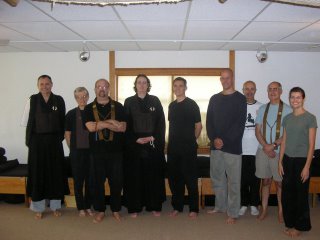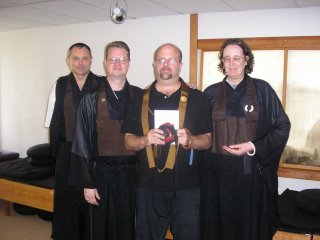 This whole Pluto thing has been cracking me up for weeks now, but it's been bugging me, too, and I finally figured out why.
This whole Pluto thing has been cracking me up for weeks now, but it's been bugging me, too, and I finally figured out why.As everyone knows, unless they've been on Pluto for the last couple of months, in August the International Astronomical Union in Prague voted to strip Pluto of its long-standing status as a planet. Pluto was discovered in 1930 and immediately named the ninth planet. It was originally thought to be largely than it is, and astronomers for years have pretty much agreed it should never have been named a planet in the first place. It's basically a big rock floating around in a weird orbit, usually outside the orbit of Neptune. On September 9, it was assigned the new designation 13430 by the Minor Planet Center.
What's great is the outcry over Pluto. The IAU was deluged with letters from schoolchildren protesting the "death" of this character, Pluto. Suddenly, the story of the planets, and the mental picture we all had of our solar system as this glowing ball surrounded by nine precisely-labelled little balls was gone. Of course, it was never like that in the first place; our system is a messy one, a big nexus of flaming gas surrounded by a small amount of debris orbiting it at great distances, mostly empty space and a bunch of rocks, eight of which now have the requisites the IAU has defined for planets. My point is that we collectively as a culture had given Pluto an identity. We named this rock after the Roman god of the underworld. Then again there's that dog. So for the children, and for all of us, suddenly one of the comfortable characters we've lived with all our lives is gone.
Now we adults know that Pluto is and always was just a rock, and the news stories have mostly been humorous because we realize that the redesignation of Pluto changes nothing. Yet we still have that feeling on the edge of our perceptions that something is missing. What this really should illustrate for us, in a fairly harmless and palatable way, of the value of a name, or more accurately, of the power of naming something.
Someday I'm going to have to address the whole animal rights/vegetarianism issue, a quagmire I'm not looking forward to. But for now let's just stay close to home and talk about our pets. Readers of this blog know how attached I am to my old cat, Ms. Johnson. If you check the archives for last year, you can find pictures of Stephanie's dog Gizmo. They get treated like people. If you scroll to the bottom of this blog, you can watch a blurry cell phone video of two of my dad's beagles, Mona and Lucky.
Mona and Lucky are excellent illustrations of the power of a name. My dad has had beagles for most of his life. For the most part, these old country guys don't treat their dogs like pets. His beagles have names because they are registered purebreds, but until recently they rarely got called by them. They live mostly in elevated cages in a pen behind his house. If they're lucky they get let out a few times a week to run rabbits, then back in the cages. But suddenly, for whatever reason, he asked me to name Mona about seven months ago, then Lucky got a name, and the two get preferential treatment; they get to come out and play like pets. Now some of the older dogs have acquired more personality, in his eyes; they get called by their names and even old Sam's been let out to play with Lucky. Suddenly these dogs exist.
You should realize, these old guys are known to shoot beagles in the field because they won't perform. They've been treated like, well, animals.
Now broaden the scope a minute. I would never consider eating Ms. Johnson (she'd be old and tough anyway), but there are millions of cats everywhere in America, many of whom are feral, and many of whom live like animals. They starve to death, are tortured to death for experiments, or are generally neglected and/or abused. Some actually do get eaten. I can't take all of this upon my head. I can't be responsible for the fate of all cats. I've made the choice, conscious or not, to give Ms. Johnson a name, to respect her personality. She's a person to me.
The bottom line is, and I'm sure the more astute of you are already waiting for me to spit it out, these creatures, like Pluto have been anthromorphized. Go look at your old English textbook for poetic devices. In other words, these pets, like Pluto, have been endowed with human identities and personalities in our little conceptual worlds. Ms. Johnson has no more personality than the street cats I ignore (OK, I can still look at cats whose names I don't know and wild animals like squirrels and temporarily endow them as characters with personalities without naming them, but that's just an extension). The real lesson here is about how we define our realities. Ms. Johnson is real because I make her real, in my world. To some Asian chef somewhere, she is just overage meat. Gizmo, on the other hand, is porky and might be quite tasty. Pluto is a rock.
This is really not about animals, despite the correllary that PETA is basically a result of category errors in human thinking (go back and find the entry on Gilbert Ryle; Wittgenstein to follow). The lesson is about how we view ourselves. Buddhism teaches that the self is not real; it is our little minds' conceptualization of how it perceives and deals with an amalgamation of traits and really, behaviors, actions, that we can deal with in our frames of perceptions as entities. All that is really useful; people act like people, so it helpful for us to think of them that way. But the bottom line is, they're not real. You're not real in the sense that you're any different from me or Ms. Johnson or Pluto, exception by definition. Your definition, and the cultural one you share with the other self-defined humans. You're a useful conceptualization for the material world. Your life is a story you tell yourself. Your whole reality is like that. Tell yourself a different story and everything changes.
So why is this useful? After all, we live the way we do for a reason. Your brain and your conceptual reality can only handle so much input. I can't shake the hand of an arbitrary batch of attributes, but I have the shake the hand of the guy I want to offer me a job today. I can't be responsible for the life of every stray cat, but I can continue to make Ms. Johnson special and allow her her personality. This is why PETA is a path to despair; the responsibility to save all beings is overwhelming, and one quickly learns to start with that same non-existent self, to get it done. But we can extend the logic the other way, into the larger real world, and maybe benefit from some compassion. It is a little odd that your pet's life means more to you than the lives of those millions who died in the tsunami. Why are those who died in the World Trade Center revered, but the thousands murdered by our neo-Fascist government, in the Middle East and otherwise, are ignored? Because we can make the ones close to us real, and the ones far away, most of whom we have relegated to less-than-human status by demonizing them, are de-anthromorphized, made unreal. We couldn't let ourselves or our "heroes" slaughter them otherwise, could we? How about the millions we put in prison?
In fact the animal rights people have a point. Pigs are as intelligent as dogs, scientists tell us. Yet Gizmo eats pork. We have made our definitions and live our realities by them. I'm not saying this is wrong; we just need to realize that our definitions are user-based and always somewhat arbitary. They are necessary to live our cultural lives as humans, but the attributes we stick on animals and planets are not intrinsic in their existence. They are just part of our labeling process, and the labels can be changed, or ignored.
So is Deuce Rufus more or less real than I am? You choose.



